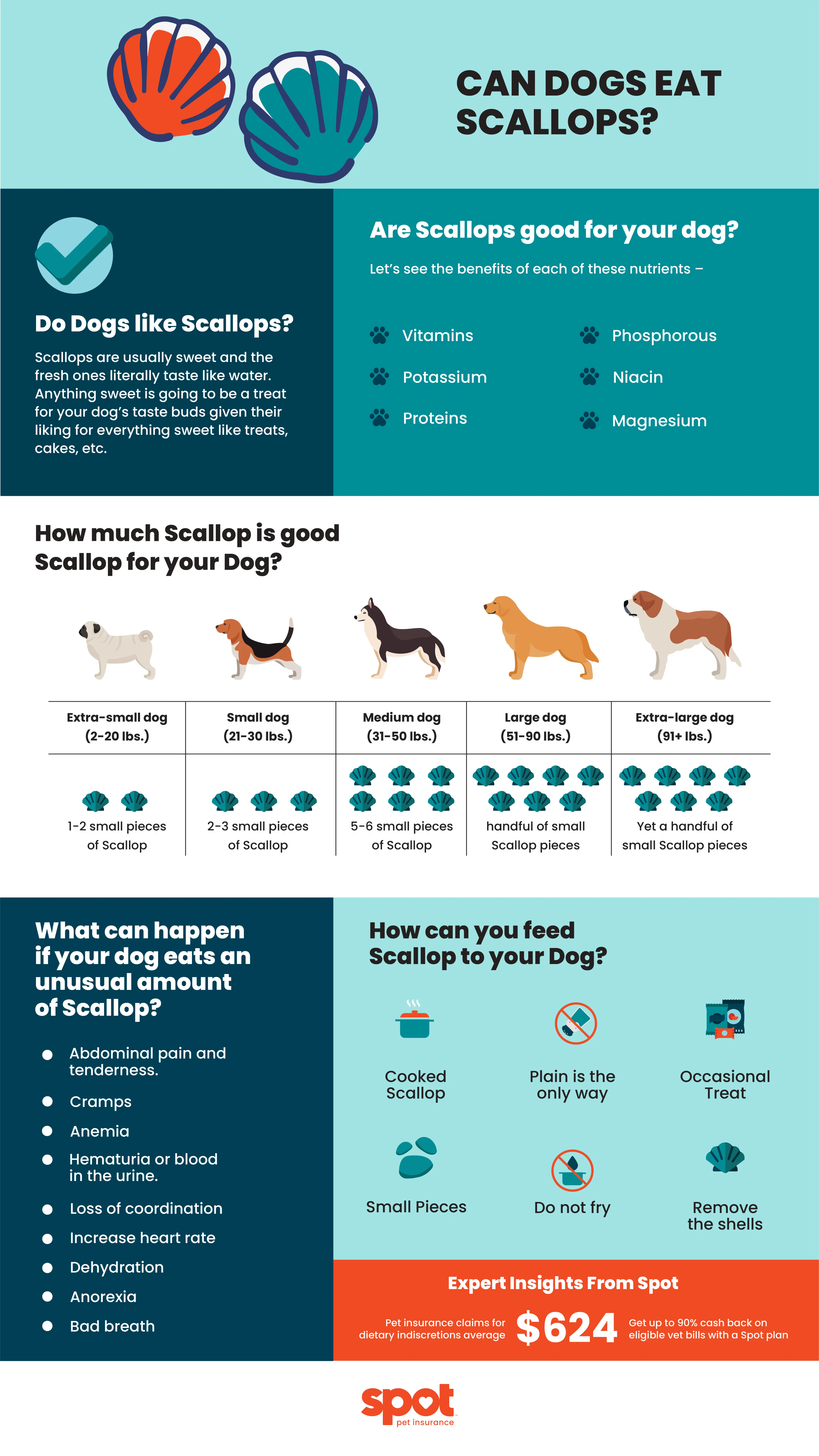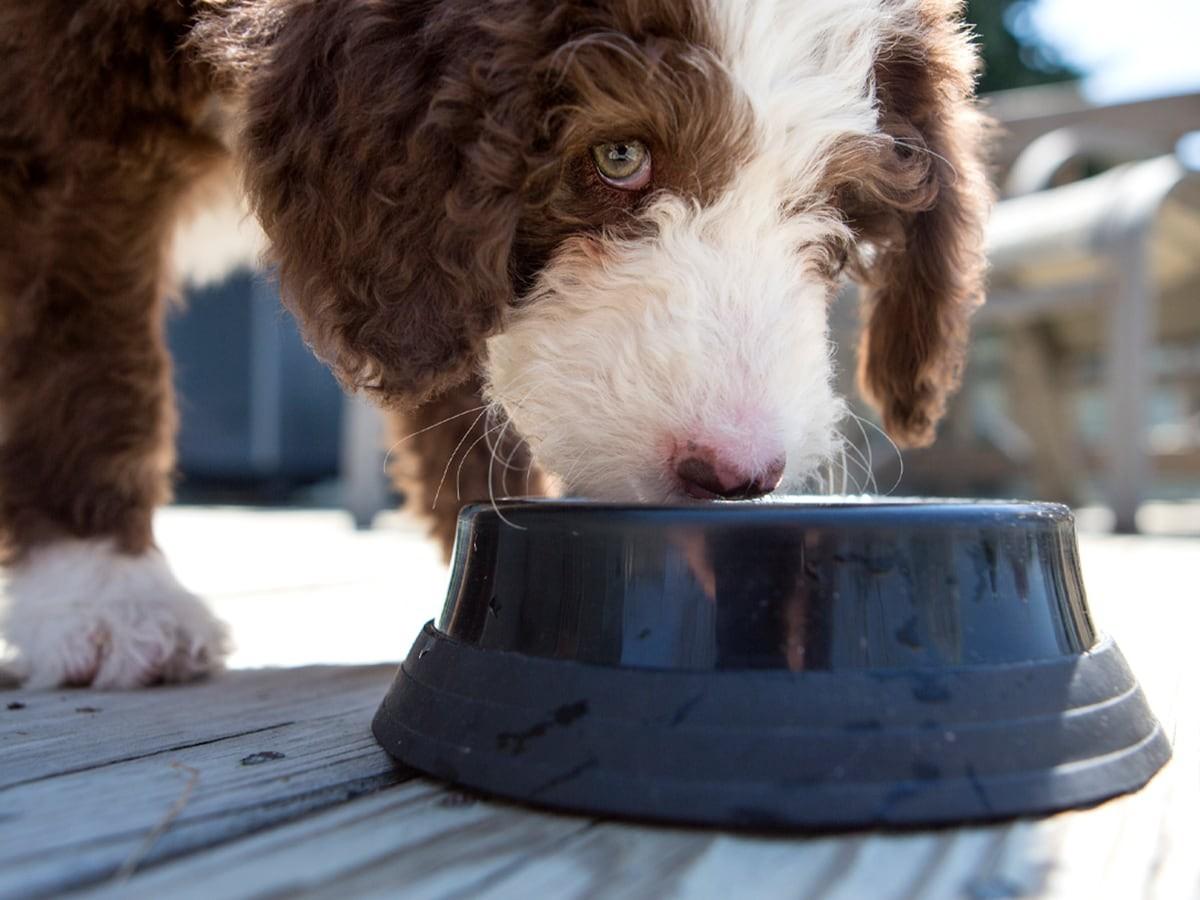Scallop- not a dish exactly but a common term given to the species of marine shell like looking mollusks which is an invertebrate species with over 85000 variants. For the human tongue, these are delicious and sweet flavored and they are very rich in nutrients. So definitely a treat for the tongue and the gut both for humans. Now, the question here is whether dogs like to eat scallops, or not? And are scallops even good for dogs? The answer is, yes!
Do Dogs Like Scallops?
Scallops are usually sweet and the fresh ones can literally taste like water. Anything sweet is likely going to be a treat for your dog’s taste buds given their liking for everything sweet like treats, cakes, etc.
Are Scallops Good for Your Dog?
Scallops contain magnesium, potassium, protein, and phosphorus, among other vitamins and minerals, and can benefit your dog’s health. And each of these nutrients are very essential for your dog’s growth, especially in the early growing stage. Let’s see the benefits of each of these nutrients2 –
Vitamins – are good for their eyesight, especially for the matured ones, as they help prevent cataracts and helps avoiding night blindness and even dry eyes. They are essential fat-soluble vitamin that has functions supporting bone growth, reproduction, cellular differentiation and immune response in dogs. They also boost energy metabolism and assists skin tissue maintenance. For the young puppies, they help support their overall growth.
Potassium – It aids in the functioning of electrical charges in the heart, nerves, and muscles. It also helps to revive the dogs energy if it is feeling tired all the time.
Proteins – It is important for dogs to repair their muscles as well in case of any injury or for gaining strength. Scallops contain proteins which can help repairing muscles and other body tissues. In addition to proteins, they are also rich in potassium which can help improve your dog’s nerves and muscles.
Magnesium – It helps regulate blood glucose levels and aids in the production of energy and protein. Other benefits include maintaining normal nerve to muscle function, support a healthy immune system and keep the heart beat steady.
Phosphorous – It is a mineral which helps a dog keep its teeth and bone healthy and also keep the metabolism on track
Niacin – Niacinamide, also called vitamin B3 is a nutritional supplement and immunomodulator used in conjunction with other medications to treat inflammatory skin conditions in dogs, such as lupoid or pemphigoid conditions
They are other nutrients as well in Scallops. So all in all, it becomes a super food for your doggy. But does that mean they should be fed lots and lots of Scallops for them to stay healthy? The answer is – No.
How Much Scallop Is Good Scallop for Your Dog?
Scallop may not be a part of a dog’s regular diet. So first of all, it should be tested to check if the dog is not allergic to it. When introducing it, it should be limited to 1-2 small pieces. Now if we conclude that the dog eats it just fine then the quantity can be increased as per the dog’s size. Let’s break this down according to the breeds and sizes of the dogs.
Extra-small dog (2-20 lbs.) = 1-2 small pieces of Scallop
For e.g.: Yorkies, Chihuahuas, Pomeranians, Pugs
Small dog (21-30 lbs.) = 2-3 small pieces of Scallop
For e.g.: Basenjis, Beagles, Miniature Australian Shepherds
Medium dog (31-50 lbs.) = 5-6 small pieces of Scallop
For e.g.: Basset Hounds, Border Collies, Australian Cattle Dogs, Siberian Huskies
Large dog (51-90 lbs.) = handful of small Scallop pieces
For e.g.: Pit Bulls, German Shepherds, Labrador Retrievers, Australian Shepherds
Extra-large dog (91+ lbs.) = Yet a handful of small Scallop pieces
For e.g.: Newfoundlands, Bernese Mountain Dogs, St. Bernards, Great Pyrenees
How Can You Feed Scallop to Your Dog?
We have established that scallops are good for your dog, but there is a method in which they should be served otherwise it can lead to some unfavorable outcomes. Below are some cautions to be taken before serving a scallops to your dog.1
Cooked Scallop – Never ever feed your dog a raw scallop or any seafood for that matter. It is not toxic per se but anything raw can be susceptible to a lot of bacteria and diseases which can upset your dog’s stomach.
Plain is the only way – Dog’s stomachs are not made for anything spicy or salty or even very sweet for that matter. So, while serving Scallops, make sure they are plain without the use of any butter, salt or any other spices.
Occasional Treat – A scallop, despite its nutritional properties should be offered as an occasional treat for good behavior or probably just because you love him/her but not to be included as an integral part of the diet.
Bake properly – Ensure that your scallops are thoroughly baked and no part of it is raw while serving. Raw ones can contain salmonella, roundworms, tapeworms or other dangerous bacteria.
Do not fry – Oil is a No-No for your dog in any case, especially when something is deep fried.
Remove the shells – Dogs can very easily choke on the shells and can even be deadly at times. Remove the shells before feeding.
Let’s cool down – There might be excitement to see your dog’s reaction to it trying a new food but don’t rush and give it the hot ones. Wait for them to cool down to avoid tongue burns.
Small is big – Small pieces would do a big help to them to avoid choking hazards.
Be ready to enjoy a ton of love in the form of licks after your dog licks off the bowl!
But make sure you don’t get too greedy for love from your doggo and end up feeding a lot of Scallops to him / her. More Scallops ≠ More Love
What Can Happen if Your Dog Eats An Unusual Amount of Scallop?
If your dog ate some Scallop when you were busy making that Vegas plan with your friends or probably listening to Coldplay or you were feeling a lot of love towards your doggo and ended up feeding more than recommended amount, keep an eye out for the following symptoms of an upset stomach. You should contact your vet right away if you see1 –
Abdominal pain and tenderness
Cramps
Anemia
Hematuria or blood in the urine
Loss of coordination
Increase heart rate
Dehydration
Anorexia
Bad breath

Expert Insights From Spot
While sharing our favorite foods with our pets can be tempting, it's important to remember that not all human foods are safe for dogs. Spot's internal data shows that pet insurance claims for dietary indiscretions average $642*, highlighting the importance of caution and research before sharing snacks with your pet.
Seafood Your Dog Can Eat
Dogs can safely consume seafood. If they eat shellfish like crabs or lobsters their shells, legs, and tails should be removed to avoid the possibility of puncturing their internal organs. Dogs can also eat fin fish, like salmon, shrimp, and some tuna (in moderation) if their bones are removed for the same reason. Your dog might benefit from staying away from canned tuna if it comes in a package filled with salt water or contains any extra salt. Likewise, seafood given to dogs should not be seasoned at all.
Seafood can have bacteria and other toxic elements in it when they’re undercooked. Because of this, seafood should always be thoroughly cleaned and cooked before it’s offered to your dog.
Conclusion
Keep it plain and simple when it comes to Scallops and use them as an occasional treat for a good training session or good behavior for your dog and you’re good to go. Your dog will definitely enjoy it.
Happy Mood and Health to your Doggo and lots of Love and Licks to you!

Mostly a tech person, always a pet person. I am dedicated to improving the lives of pets and their humans with technology. Off-duty, I enjoy writing about the misbehaving of computer programs and my two Aussiedoodles, Calvin and Hobbes.
*Jan 2019 to Aug 2024 administrator claims data.
“Can Dogs Eat Scallops? 3 Benefits of Scallops for Dogs - 2024.” MasterClass, 22 April 2022, www.masterclass.com/articles/can-dogs-eat-scallops.
Mlynar, Phillip. “Can Dogs Eat Scallops? Are Scallops Safe for Dogs?” DogTime, 4 May 2022, dogtime.com/dog-health/dog-food-dog-nutrition/96200-can-dogs-eat-scallops-safe
“Can Dogs Eat Scallops? Nutritional Benefits and Safety Tips.” The Dogs Meal, 9 May 2024, thedogsmeal.com/can-dogs-eat-scallops/.
The information presented in this article is for educational and informational purposes only and does not constitute or substitute for the advice of your veterinarian.












